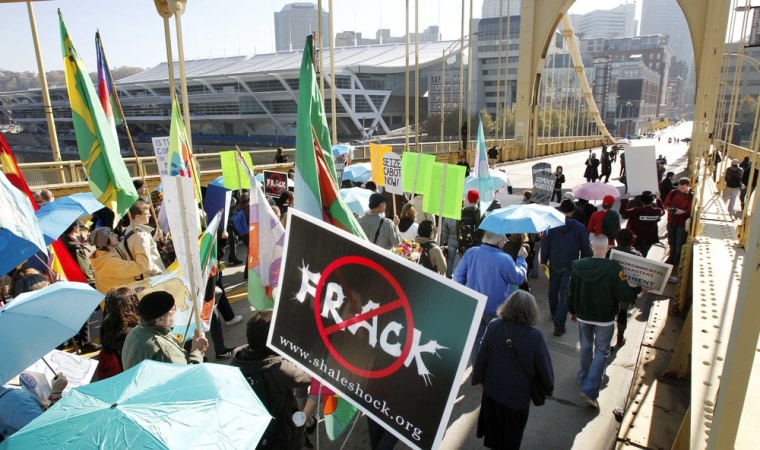Already on the hot seat over its role in the Gulf oil spill, Halliburton refused to list the chemicals used in a natural gas drilling technique and, as a result, the Environmental Protection Agency on Tuesday subpoenaed the energy services giant to provide those details.
The EPA said it issued the subpoena after Texas-based Halliburton refused to voluntarily disclose the chemicals used in the controversial drilling practice known as hydraulic fracturing or "fracking." Halliburton was the only one of nine major energy companies that refused the request, the EPA said.The agency said the information is important to its study of fracking, in which crews inject vast quantities of water, sand and chemicals underground to force open channels in sand and rock formations so oil and natural gas will flow.
The EPA is studying whether the practice affects drinking water and the public health. Environmentalists are concerned that the chemicals, some of them carcinogens, will taint underground water supplies.
The EPA is taking a look at fracking as gas drillers swarm to the lucrative Marcellus Shale region in the northeastern United States and blast into other shale formations around the country.
A Halliburton spokeswoman, Teresa Wong, said the agency's request, made in September, was overly broad and could require the company to prepare about 50,000 spreadsheets.
"We have met with the agency and had several additional discussions with EPA personnel in order to help narrow the focus of their unreasonable demands so that we could provide the agency what it needs to complete its study of hydraulic fracturing," Wong said. Halliburton turned over nearly 5,000 pages of documents last week, she said.
An EPA official said Halliburton had submitted publicly available forms that describe the general hazards associated with various chemical mixes.
"While these are helpful, they do not identify each and every chemical in a mixture, which is precisely the sort of information EPA needs to understand the risks these ... mixtures may pose to drinking water supplies," the official said.
The EPA had also asked all of the companies for standard operating procedures that govern the choice and amount of chemicals and water used in fracking jobs, along with locations of every fracking job undertaken in the previous year or planned for the next. Halliburton has not given that information.
Halliburton, which did critical cement work on the doomed Deepwater Horizon rig in the Gulf, is also involved in large military contracts ranging from construction to delivering supplies. It first became known to the general public when its former CEO, Dick Cheney, was picked by George W. Bush as his running mate.
Drilling companies have largely sought to protect their chemical formulas, calling them proprietary.
Fracking, which is exempt from federal regulation, is touted as the key to unlocking huge reserves of clean-burning natural gas.
Supporters say the practice is safe, noting that it is done thousands of feet below ground, much deeper than most water sources. They also point out that authorities have yet to link fracking to contaminated drinking water.
Many energy companies have rushed to tap America's large reservoirs of natural gas hidden in shale rock formations. The largest is the Marcellus shale.
Drilling crews have been flocking since late 2008 to Marcellus, a rock bed the size of Greece that lies about 6,000 feet beneath New York, Pennsylvania, West Virginia and Ohio, with money from companies around the world financing the exploration.
Geologists say it could become the nation's most productive natural gas field, capable of supplying the entire country's needs for up to two decades by some estimates.The fracking technologies have brought down the cost of production, but the health concerns have led some governments to take action. In Pennsylvania, Gov. Ed Rendell last month signed an order banning any further leases of state forest land for fracking.
Kathryn Klaber, president of the Marcellus Shale Coalition, an industry group, said the natural gas industry has safely and responsibly operated on public lands for years.
"This responsible production of clean-burning, homegrown natural gas is creating tens of thousands of local jobs and hundreds of millions in tax revenues for the commonwealth," Klaber said."
Despite enormous supply and weak consumption, natural gas is expected to be in high demand in coming years because it's plentiful throughout the U.S. and produces fewer emissions compared with other fossil fuels.
Rendell, a Democrat, put 1.5 million acres off limits to energy companies. Though it could be overturned after Rendell leaves office in January, he urged the gubernatorial candidates running in the Nov. 8 election to preserve it.Such lands make up less than 10 percent of the total area of the Marcellus in Pennsylvania, estimated Terry Engelder, a geologist at Pennsylvania State University, and there are only about 20 Marcellus wells producing gas on state lands now.
But even with the moratorium, that could rise as high as 12,000 wells in the next 20 years as energy companies exploit the vast gas field, said John Quigley, secretary of the state's Department of Conservation and Natural Resources.
Pennsylvania has already leased about one-third of its 2.2 million acres of state forest for gas drilling. The leased area represents about half of the public land covering the shale gas deposits.
"Drilling companies' rush to grab private lands across the state has left few areas untouched by widespread industrial activity," Rendell said in a ceremony. "We need to protect our un-leased public lands from this rush."
